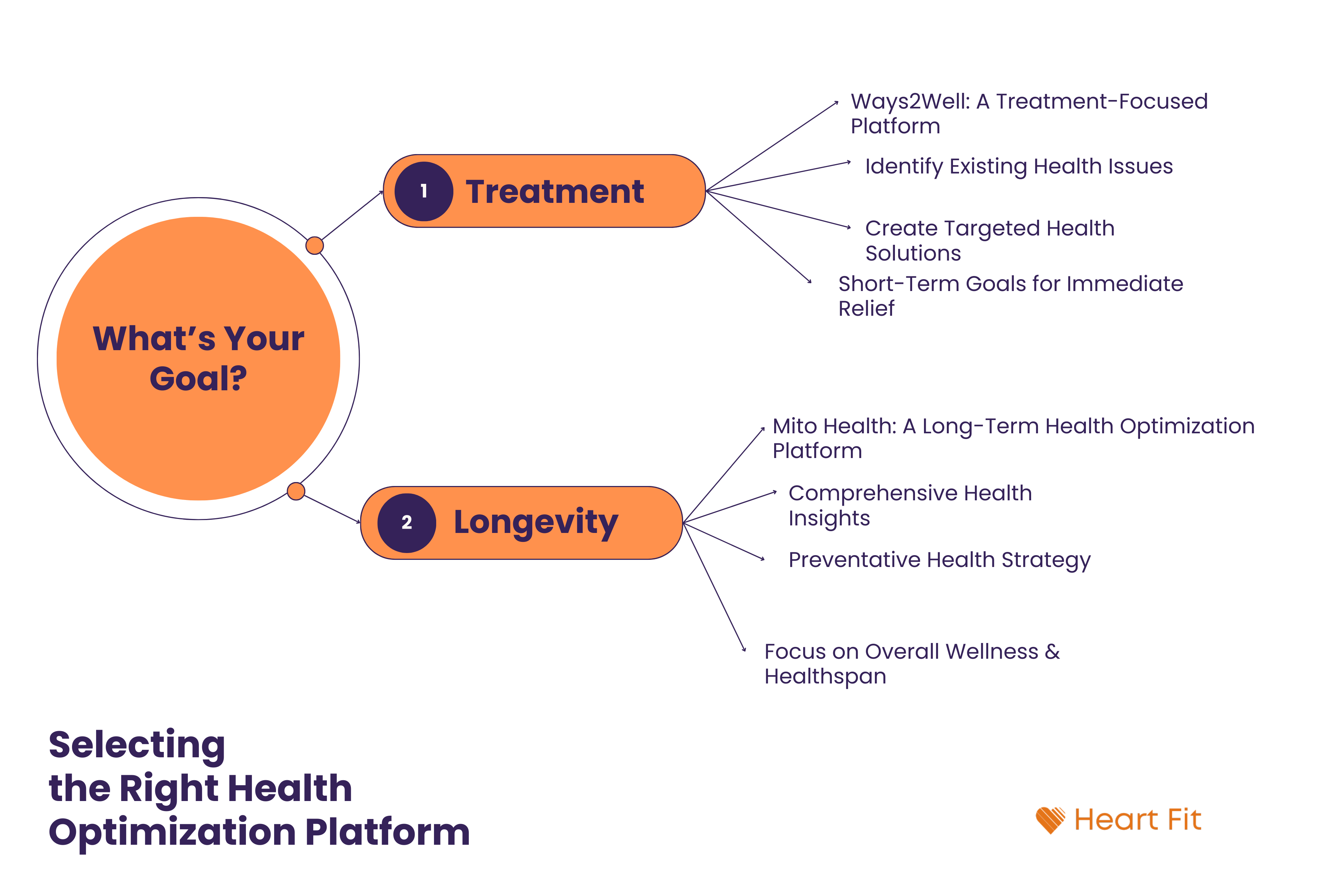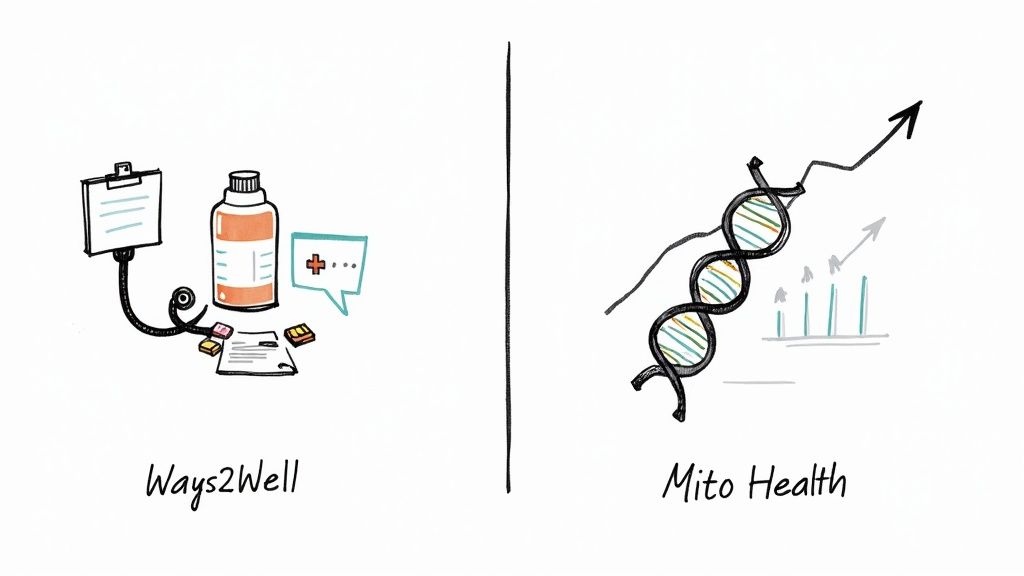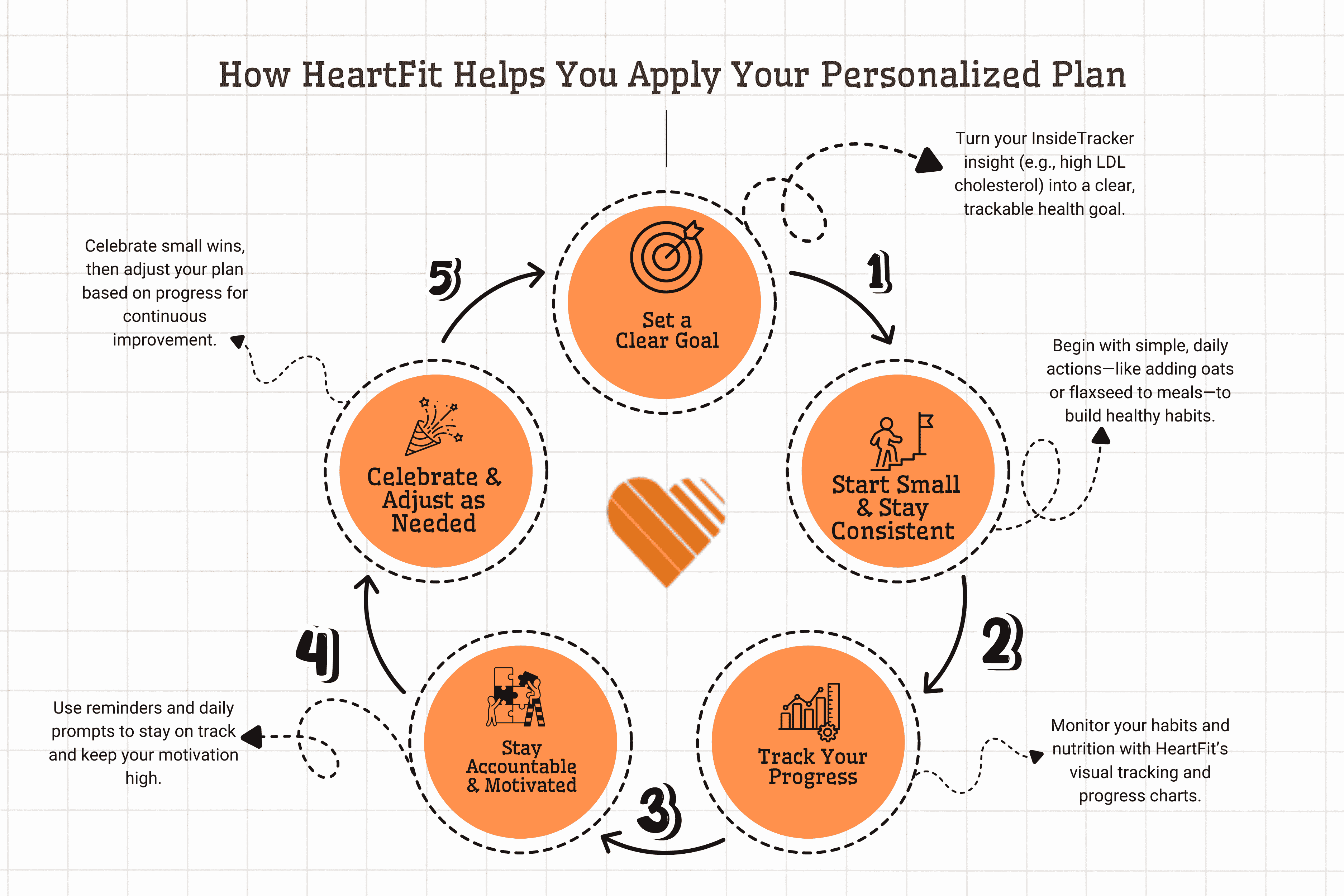Explore our Ways2Well vs Mito Health comparison to see which platform fits your goals. Analyze key differences in testing, services, and costs.

When you're looking at Ways2Well versus Mito Health, the decision really boils down to one simple question: Are you trying to fix a specific problem, or are you trying to optimize your long-term health?
Think of it this way: Ways2Well is a functional medicine telehealth provider built to treat specific health problems, like a hormone imbalance or thyroid issues. Mito Health, on the other hand, is a precision longevity platform focused on proactively fine-tuning your health to lower your biological age, based on deep biomarker analysis.
If you have a clear issue you need to address, Ways2Well is the more direct route. But if your goal is long-term peak performance and disease prevention, Mito Health is likely the better fit.
This article is for informational purposes only and is not a substitute for professional medical advice. Always consult with a qualified healthcare provider before making any lifestyle or medication changes.
We're seeing a massive shift in wellness right now. People are moving away from just reacting to sickness and are instead getting proactive, using data to build a longer, healthier life. Both Ways2Well and Mito Health are big players in this space, but they come at it from completely different angles. Getting this fundamental difference is the key to picking the right one for you.
The preventative health and wellness sector is booming, with individuals increasingly seeking science-backed insights they can use to improve their healthspan. The choice is pretty clear when you break it down: are you looking for a treatment plan for an existing problem, or are you aiming for long-term health optimization?

This visual really cuts to the chase, putting Ways2Well in the "treatment-focused" lane and Mito Health squarely in the "proactive longevity" lane.
Let's put them side-by-side to make the contrast even clearer. And if you're curious how Mito stacks up against other biomarker services, we've got a great breakdown in our Inside Tracker vs Mito Health guide.
Feature Ways2Well Mito Health Primary Goal: Treat existing health conditions (e.g., hormone imbalance, thyroid issues). Optimize long-term health, performance, and longevity. Approach Functional Medicine Telehealth Precision Longevity & Health Optimization User Someone with specific symptoms seeking a diagnosis and treatment plan.Someone proactive about health, seeking to prevent disease and enhance wellness. Data Focus Symptom-driven lab testing to identify root causes of illness.Comprehensive biomarker analysis to assess biological age and performance.
.png)
Disclaimer: This article is for informational purposes only and is not a substitute for professional medical advice. Always consult with a qualified healthcare provider before making any changes to your health regimen.
When you line up Ways2Well and Mito Health, you're looking at two fundamentally different ways of thinking about health. This isn't just about picking a service; it's about choosing a philosophy that matches where you are right now and where you want to be down the road.
Ways2Well is built on a functional medicine telehealth model. You come to them when you're already dealing with something—fatigue, stubborn weight gain, or hormonal irregularities. Their job is to identify the root cause and create a targeted treatment plan. Think of it as specialized virtual care for fixing an existing problem.
The process with Ways2Well is direct and patient-focused. If you're feeling off and need answers, this is the path you take.
It usually unfolds like this:
This model is all about intervention. It’s for people who know something isn’t right and need a clinical expert to help them fix it.
According to the Centers for Disease Control and Prevention (CDC), six in ten adults in the US have a chronic disease, highlighting the clear need for effective treatment. Ways2Well’s approach is designed to manage the very conditions that often lead to these long-term issues.
Mito Health, on the other hand, operates from a longevity and health optimization model. The whole idea is to be proactive. This service is for people who might feel perfectly fine but are driven to boost their performance, slow down the aging clock, and head off future diseases before they start. It's about going from "not sick" to truly thriving.
Mito Health's approach is built on deep data and ongoing coaching:
This is a client-first model that puts you in the driver's seat with data-driven insights for long-term health. It’s a strategy backed by organizations like the National Institute on Aging, which consistently highlights the power of lifestyle in healthy aging.
In short, the choice boils down to a simple question: Do you need a clinician for a problem you have now, or a coach for the future you want to build?
The real difference between Ways2Well and Mito Health boils down to how they collect and interpret your health data. The type of testing they do—and how deep it goes—directly shapes the advice you get. Are you looking for a diagnosis for something bothering you right now, or a long-term roadmap for better health?
Ways2Well takes a targeted, symptom-driven approach to testing. Your first step is a consultation to discuss what’s going on, whether it's nagging fatigue or trouble with weight management. Based on that conversation, they'll order specific blood panels and advanced hormone tests to find the root cause. It’s a very focused and efficient way to get a diagnosis.
Mito Health, on the other hand, goes for a broad, preventative strategy with deep biomarker analysis. They screen for a huge array of markers—often over 100—to create a complete picture of your current health and identify future risks. The goal here isn't to solve one specific issue but to understand your entire biological system.

This kind of extensive screening allows Mito Health to calculate advanced metrics like your Phenotypic Age (sometimes called biological age), giving you a sense of your health at the cellular level. It’s all about catching small imbalances before they snowball into chronic problems.
How these services present your data is just as critical as the tests themselves. Ways2Well delivers clear lab reports that link directly to a proposed treatment, which often includes prescriptions. The path from your test result to a concrete action plan is immediate and clinical.
Mito Health organizes its mountain of data into a clean, easy-to-read dashboard that tracks trends and longevity metrics over time. The insights are geared toward long-term lifestyle changes in nutrition, exercise, and supplements, with guidance from a health coach.
The goal of deep biomarker testing is to move from reactive treatment to proactive optimization. By identifying subtle risk factors early, you gain the opportunity to make targeted lifestyle changes that can significantly alter your long-term health trajectory.
For a clearer picture, let's look at the core differences side-by-side.
Feature Ways2Well Mito Health Testing Approach Symptom-driven, targeted panels.Comprehensive, preventative screening (over 100 biomarkers). Primary Goal: Diagnose and treat existing conditions. Optimize long-term health and longevity. Data Interpretation on clinical diagnosis for immediate action.Analysis of trends and advanced metrics like Phenotypic Age. Action Plan often involves prescription-based treatments. Lifestyle adjustments (diet, exercise, supplements).User ExperienceStraightforward: consult, test, treat. Ongoing: test, analyze trends, adjust lifestyle with coaching.
This table highlights the fundamental split in their philosophies: Ways2Well is about fixing a problem, while Mito Health is about building a foundation for future wellness.
Ultimately, the best choice really hinges on what you’re trying to achieve with your health.
Understanding this core difference is key. While both platforms use bloodwork, their end goals couldn't be more different. This is a common theme in modern health services, and you can see a similar dynamic in our detailed comparison of Everlywell vs Mito Health tests, which further explores how different services handle data collection and analysis.
Getting your health optimized isn't a one-and-done deal. It takes ongoing guidance and smart adjustments as you go. When you look at Ways2Well versus Mito Health, their support systems couldn't be more different, reflecting two fundamentally separate philosophies on how to get you to your goals.
This article is for informational purposes only. You should always consult a qualified healthcare provider for medical advice and before making any changes to your health regimen.
Ways2Well operates on a direct clinical management model. Think of it as specialized telehealth. After your initial lab work, you meet with licensed nurse practitioners who are there to interpret the results, give you a diagnosis, and map out a treatment plan. For many, this includes prescriptions for things like hormone replacement therapy or thyroid support.
This setup is useful if you're looking for clear medical direction to tackle a specific condition. Support is hands-on and provider-led, involving follow-up appointments to check your progress and tweak prescriptions.
Mito Health goes a different route, building its support around a health coaching model focused on lifestyle changes. Instead of clinicians who write prescriptions, you get a dedicated health coach. Their job is to help you make sense of all your complex biomarker data and turn it into small, sustainable actions you can take every day.
This approach is less about immediate medical treatment and more about fostering long-term behavioral change. Your check-ins will revolve around putting diet, exercise, and supplement recommendations into practice to nudge your metrics in the right direction over time. This aligns well with guidance from the American Heart Association, which emphasizes the massive role lifestyle factors play in cardiovascular health.
In short: Ways2Well is a classic patient-provider relationship focused on treatment. Mito Health offers a client-coach partnership aimed at proactive optimization and refining your lifestyle.
Both platforms give you digital tools to follow your journey, but they're built for different purposes.
Ways2Well’s portal is a functional hub for managing your clinical care. It's where you'll book appointments, look at lab results, and handle your prescriptions. It gets the job done for managing your treatment plan.
Mito Health’s platform, on the other hand, is designed to be your long-term health dashboard. It excels at visualizing trends in your biomarkers, tracking your biological age, and giving you a central place for your personalized action plan. It's built to show you the real-world impact of your lifestyle tweaks between lab tests.
In the end, it really boils down to the kind of guidance you need right now. If your situation calls for medical intervention and prescriptions from a licensed provider, Ways2Well's clinical model is the right fit. But if you’re looking for an expert partner to help you implement and stick with data-driven lifestyle changes for long-haul wellness, Mito Health’s coaching approach is going to serve you better.
When you're deciding between services like Ways2Well and Mito Health, the rubber really meets the road when you look at the price tag and how easy each platform is to use day-to-day. These two factors often make or break your long-term commitment, and both companies approach them from completely different angles.
Ways2Well runs on a straightforward pay-per-service structure. You pay for what you use—each telehealth visit has a fee, and then lab tests and prescriptions are separate, variable costs. This à la carte model can be smart if you're dealing with a specific issue and just need occasional, targeted help.
Mito Health, on the other hand, is built around an all-inclusive membership model. You pay one annual fee that bundles their comprehensive biomarker testing, health coaching, and full access to their data platform. It’s a predictable cost designed for someone ready to dive deep into a year-long health optimization journey.
So, what does this actually look like in your bank account over a year? The difference can be pretty significant.
For a closer look at how these pricing models compare to others in the space, we break it all down in our guide on Function Health vs Ways2Well costs.
How you interact with your health data is just as important as the data itself. Ways2Well provides a functional, no-frills portal. It’s designed for clinical efficiency—you can book appointments and see your lab results without much fuss.
Mito Health puts a heavier emphasis on creating a sleek, intuitive dashboard meant for long-term engagement.
As you can see from their site, the interface is clean and data-forward, visualizing your key health markers over time. The goal isn't just to show you numbers; it's to make complex biomarker information easy to understand and act on.
Key Takeaway: Your choice really comes down to your personal style. Do you prefer a pay-as-you-go, treatment-focused approach? Go with Ways2Well. Or are you looking for a comprehensive, data-driven experience for long-term health tracking? Mito Health is likely the better fit.
Disclaimer: This article is for informational purposes only and does not constitute medical advice. Consult with a healthcare professional before making any health decisions.
Getting a detailed report from a platform like Ways2Well or Mito Health is a huge step. It gives you a powerful, high-level snapshot of your health. But turning those big-picture insights into real, lasting results? That happens in the small choices you make every single day.
To get the most out of your investment, you need to bridge the gap between those periodic lab tests and your daily habits. Think of it this way: your lab report is the "what," but daily tracking apps are the "how." They're the tools that help you actually implement and stick with the lifestyle changes your results call for.
To really make your Ways2Well or Mito Health plan work, you need a system to see how you're doing in real-time. Without it, you're just guessing until your next blood draw.
Here are a few solid habit and tracking apps to create that feedback loop:

So, how does this work in practice?
A Ways2Well user, for instance, could use an app like HeartFit to get crucial feedback on how a new supplement or medication is affecting their resting heart rate or sleep quality day-to-day. For a Mito Health user, it provides the granular data needed to see exactly how lifestyle tweaks are impacting stress levels and daily activity. It creates a powerful, positive feedback loop.
According to the American Heart Association, self-monitoring is a cornerstone of managing health conditions and achieving better results. When you can share data from your daily tracking apps with your provider, you're painting a much more complete and actionable picture of your overall wellness.
Ultimately, combining high-level diagnostics with daily, on-the-ground tracking creates an incredible synergy. It transforms a static report into a dynamic, living health plan. This ensures the investment you've made in a service like Ways2Well or Mito Health actually translates into measurable, long-term improvements you can see and feel.
Disclaimer: This article is for informational purposes only and is not a substitute for professional medical advice. Always consult with a qualified healthcare provider before making changes to your lifestyle or medication regimen.
As you dive into the world of personalized health, a few questions are bound to pop up. Let's clear up some of the most common ones to help you make the right call for your health journey.
In short, no. Services like Ways2Well and Mito Health are powerful tools, but they are not meant to take the place of your primary care physician (PCP). Your PCP is your go-to for general health management, acute illnesses, and coordinating care with other specialists. Think of these platforms as specialists that complement your regular care. It's always a good idea to keep your PCP in the loop about any tests or treatments you're exploring.
Typically, these types of specialized health optimization platforms operate outside the traditional insurance system. This means you’ll likely be paying for their services out-of-pocket. This direct-pay approach is what allows them to offer the kind of in-depth testing and one-on-one support that insurance plans often don't cover. Some people find they can use a Health Savings Account (HSA) or Flexible Spending Account (FSA) to cover the costs, so it's worth checking with your plan administrator.
This is a critical question. Turning insights from a detailed report into daily habits is what truly drives results. Daily tracking apps are crucial for bridging the gap between your big lab draws.
Here are our top recommendations for habit tracking apps:
Using these tools together ensures that the investment you make in a platform like Ways2Well or Mito Health actually pays off. It keeps you accountable and helps you see the small wins that lead to big changes.
Disclaimer: This article is for informational purposes only and is not a substitute for professional medical advice. Always consult with a healthcare provider before making any lifestyle or medication changes.
Ready to turn your health insights into daily action? HeartFit helps you build sustainable habits based on your unique health data. Start your free trial and discover a smarter way to manage your heart health today at https://www.heartfit.ai.